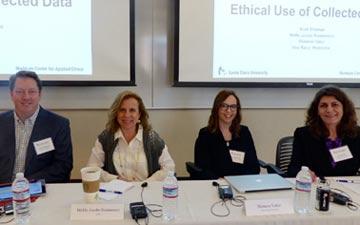
Ethical Data Collection
When we discuss the ethical issues raised by how companies are using the data they collect, we often think of how an individual interacts with a business; for example, is a patient informed about research his or her health care provider may be doing on blood samples, or does a search engine user want Google to scan emails to see what products the user may be interested in?
But at a recent meeting of the Center's Business and Organizational Ethics Partnership, Scott Shipman, general counsel and chief privacy officer at Sensity Systems, pointed out that many times, the company collecting data may be dealing with another company or government entity. Then, the final use to which the data is put may not even be understood by the individual whose data is being collected.
Summarizing Shipman's remarks, writer Margaret Steen observes:
Shipman...has a job that illustrates both the promise and the risks of using big data. Sensity is an Internet of Things company, capitalizing on the transition to LED lighting to create Light Sensory Networks that will allow cities and other entities to deliver both energy-efficient lighting and a real-time, global database of information that allows customers to manage and understand their physical environment for greater productivity, efficiency and security. He was hired as chief privacy officer to build and govern a global privacy program, in which he will establish data protection standards and lead industry-wide privacy initiatives.
